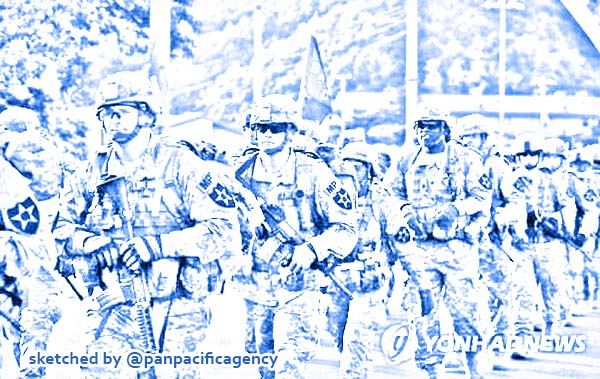S. Korea and US disagree on exercises

U.S. troops in Korea engage in an exercise. They have served as a key deterrent to North Korean invasions but their commander-in-chief, President Donald Trump, has attacked its relevancy. Yonhap. Sketched by the Pan Pacific Agency.
SEOUL, May 31, 2020, The Korea Times. South Korea and the United States are yet to reach agreement over how to execute planned joint military exercises in August, according to sources, Sunday, raising speculation that the disagreement may expand to pushing back the transfer of operational control (OPCON) of South Korean troops during wartime from Washington to Seoul, The Korea Times reported.
Hoping that it will regain OPCON by 2022, South Korea wants the upcoming exercises to be focused on assessing its relevant capabilities, but the U.S. is stressing that they need to focus on maintaining the joint military posture that may have been undermined following the postponement of annual drills in the first half of the year due to the COVID-19 outbreak.
The OPCON transition calls on a South Korean general to command the Combined Forces Command (CFC), with a U.S. general taking a supportive role. Currently, the CFC is headed by the U.S. Forces Korea (USFK) commander who also leads the United Nations Command (UNC).
In February, the allies decided to indefinitely delay their annual joint military exercises amid a surge in COVID-19 cases across the Korean Peninsula, so the U.S. military believes that the upcoming exercises in August should serve as grounds to prove their combat readiness rather than preparing for the OPCON transfer, according to the sources.
However, the defense ministry here is underscoring that they should test Full Operational Capability (FOC), in which a South Korean commander will take responsibility for the combined defense posture. The FOC is the second of the three-phase verification process for OPCON transfer and if it gets approved by the defense ministers of both sides, a Full Mission Capability (FMC) test will be carried out next year. The two sides carried out an initial operational capability (IOC) test in August last year.
“Should the FOC verification be delayed, the timeframe for the OPCON transfer could be put on hold,” a source said.
South Korea, which regained peacetime OPCON in 1994, was supposed to retake the wartime authority by the end of 2015, but the plan was delayed in 2014 after the allies agreed to seek a “conditions-based” transition due to growing tensions on the peninsula.
Those conditions include the acquisition of necessary military capabilities for a South Korea-led combined defense, the securing of critical military response capabilities by the South to deal with North Korea’s nuclear and missile threats, and the security environment on the Korean Peninsula and in the region.
“Since the middle of last year, the U.S. military, led by CFC Commander Gen. Robert Abrams, has voiced negative opinions on the OPCON transfer. What Gen. Abrams and the U.S. Joint Chiefs of Staff stress is that the transition should be based on three conditions, but they complain that the South Korean government is in a hurry to meet its own timetable,” said Park Won-gon, a professor of international politics at Handong Global University. The Moon Jae-in administration is seeking to complete the transfer before its term ends in 2022.
The difference on how to program the joint military exercises also comes after the government recently became at odds with the UNC over the latter’s role in inter-Korean affairs.
The UNC announced the findings of its investigation into a recent gunfire exchange between South and North Korean soldiers across the border, and its results were in stark contrast to the Ministry of National Defense’s conclusion. The ministry expressed regret over the announcement immediately, citing the UNC’s failure to properly investigate the North’s actions.
Some observers in military circles believe that the UNC was seeking to maintain its presence on the peninsula through the incident.
“After the OPCON transition, the U.S. will assume a supporting role on the peninsula,” Park said.
“Considering such a situation, the U.S. is seemingly seeking to exert influence here through the UNC. In addition, I think that the U.S. also has a plan to use the UNC as a replacement for the South Korea-led CFC ― although the U.S. government has denied this speculation.”
By Kang Seung-woo